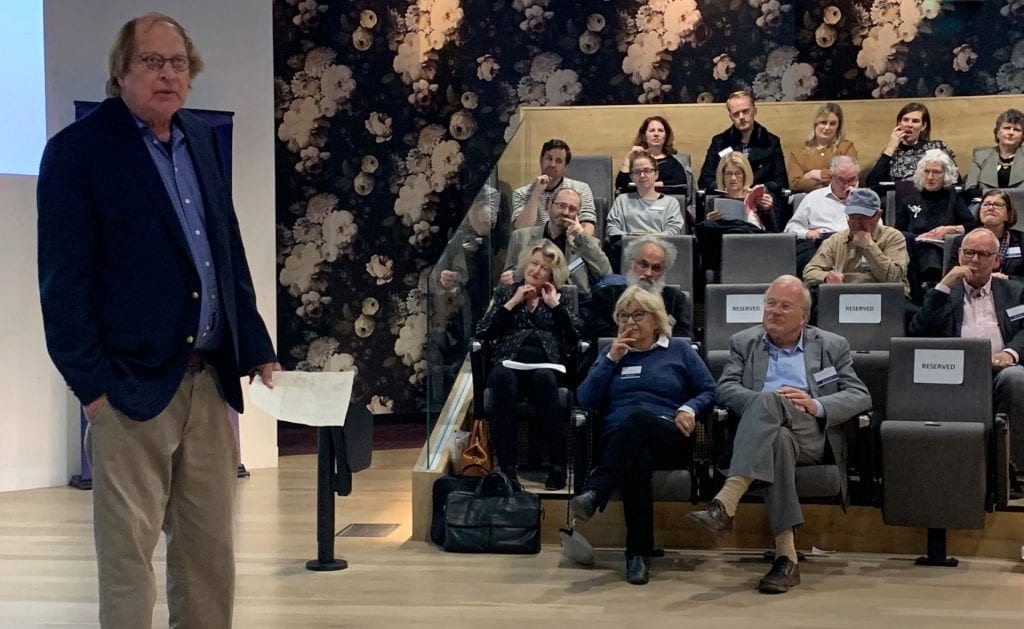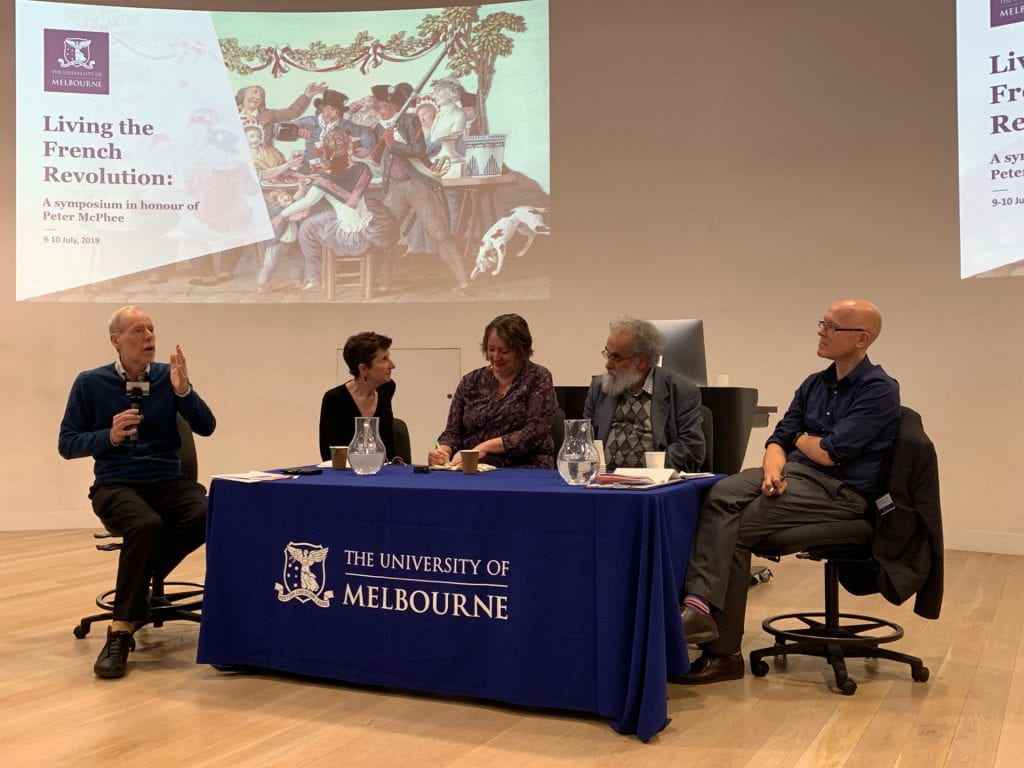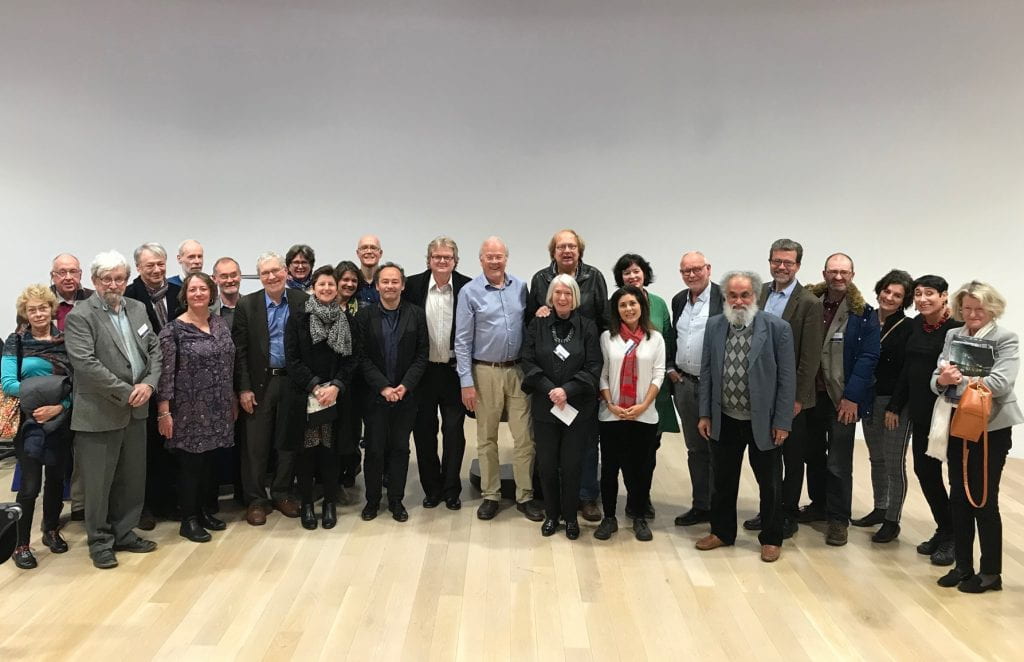
Living the French Revolution: A Symposium in Honour of Peter McPhee
The most significant event in French revolutionary studies ever to be held in Australia took place on 9 and 10 July 2019 at the University of Melbourne. Fourteen distinguished international scholars, along with their Australian counterparts, contributed to a symposium in honour of the great historian of France, Emeritus Professor Peter McPhee AM. Their presence was as much a sign of the esteem and affection in which Peter is held by his colleagues, internationally and at home, as it was of the high standing and recognition of his work over many decades. Dr Helen Davies, Honorary Fellow in SHAPS, tells us about the symposium.
Living the French Revolution attracted a large audience of historians, secondary school teachers, students, university people, and members of the public. Indeed, the symposium was declared full a month before it began!
There were several reasons why people wanted to attend. Many were alumni keen to pay their respects to a scholar who continues to teach with great distinction at this University. Some were attracted by the significance of the contributors – Sanjay Subrahmanyam (UCLA), for instance, this year shared the equivalent of the Nobel Prize for history, the Dan David Prize, for his contribution to macrohistory. Others were eager to learn of the latest scholarly thinking about the event that signalled the outbreak of the French Revolution, the Storming of the Bastille, which has its 230th anniversary this year.
No one was disappointed.
Living the French Revolution had the support of all levels of the University. An organising committee of Peter’s former PhD students initiated the event, invited the participants, gained support from within the University, developed the programme, and took part directly in the symposium, among other things. The Office of the Vice-Chancellor provided financial assistance for many international scholars. The Faculty of Arts gave invaluable support in promoting the event to alumni, arranging catering, dealing with logistical and organisational issues, and hosting the symposium dinner. And the School of Historical and Philosophical Studies hosted a reception at the conclusion of day one.

The symposium was opened by the Dean of Arts, Professor Russell Goulbourne, himself a distinguished Voltaire scholar. Two fascinating keynotes, each delivered by an eminent historian, were a focus of the first day. John Merriman, Charles Seymour Professor of History at Yale, led with an impassioned lecture on ‘Misery, Hope and Terrorism in Paris during the Belle Époque that wasn’t’ (“There was nothing belle about the Belle Époque!”). He examined the ideas of peaceful anarchists, Victor Serge and Henriette Maitrejean, juxtaposed with the use of ‘terror’ through extreme violence by late nineteenth-century illegalist anarchists, the Bonnot Gang. The second keynote took place in the evening of 9 July, when Professor Emeritus Timothy Tackett of the University of California, Irvine, presented ‘Living in Paris during the French Revolution: The Story of an Ordinary Citizen’, an absorbing account based on 1,000 letters written by an otherwise insignificant Parisian lawyer to a friend in the provinces. The lecture demonstrated superbly how concentration on the life of one individual can serve to illuminate an entire era, in this case the French Revolution. Sponsored by the Faculty of Arts and chaired by the Provost, Professor Mark Considine, Tackett’s public lecture saw the Kathleen Fitzpatrick Theatre filled to capacity.

Aside from the keynotes, over the two days and through a number of themes the programme pursued current thinking about the French Revolution and its legacy, conscious of the focus of Peter McPhee’s own work on the impact of the Revolution on ordinary people. Prominent Australian historians – Simon Burrows (Western Sydney University), Philip Dwyer (University of Newcastle), David Garrioch (Monash University), Julie Kalman (Monash University), and Charles Sowerwine (University of Melbourne) – chaired the sessions.
The environment and the revolutionaries’ engagement with environmental issues was one theme which caught the attention of Caroline Ford (UCLA), whose paper concerned the systematic plantation of pine forests in the heathland of Gascony to counter the problem of sand drift during the Revolution and its impact on the existing agricultural economy. Hamish Graham (WSU) challenged the commonly held contention that the Revolution was a disaster for France’s woodlands and highlighted the difficulties in policing forests in France even prior to the Revolution. For Rod Phillips (Carleton University), with knowledge of relative quality and regional distinctions in wine production already evident before the Revolution: “wine represented a challenge to those who promoted an egalitarian society in an inclusive and unified France”. Allan Potofsky (Université Paris Diderot) took us back to Paris on the eve of the Revolution when ideas of improving a decaying and insalubrious capital ended in controversy, paving the way for a radically new approach to property ownership and urban development embodied in the 1789 Declaration of the Rights of Man and the Citizen.

Sophie Matthiesson (National Gallery of Victoria) explored cultural difference in a paper focused on paintings and drawings by prisoners incarcerated in prisons of the Revolution. These art works clearly showed that even political prisoners shared in the patriotic fervour of national celebrations, like the inauguration of the new state religion, the Festival of the Supreme Being. Ian Germani (University of Regina) dealt with changing attitudes to death during the Revolution, from patriotic sacrifice to sentimental sorrow, in a period when the numbers of casualties on the battlefield were to equal those of the First World War. Kieko Matteson (University of Hawaiʻi, Mãnoa) addressed once more the question of increasingly scarce forest resources, this time in post-revolutionary rural France, in which the competing needs of individuals and the state resulted in violence against forest guards and the 1813 murder of two imperial guards in eastern France.
Several papers again took up the individual life as a lens through which to capture and explore a complex period of upheaval. Sanjay Subrahmanyam spoke about a Franco-Irish military officer, Thomas Conway (1735–1800), who fought for the French in the Seven Years’ War; for George Washington in the American Revolutionary War from 1777 to 1778 in a high military post from which he was dismissed; and then in the Cape Colony, and Pondicherry as Governor in 1787. On returning to France, Conway in 1793 led the royalist forces in southern France during the Revolution, but on being condemned to death was forced to flee back to Ireland where he died in obscurity. Ian Coller (UC-Irvine) drew attention to another individual, Michel Fertali, “subject of the Ottoman Porte” who, in 1799, became the first Muslim citizen of France. Through this life, Ian highlighted both the changes which had taken place in France over the ten years since the Revolution had broken out, and the changes in thinking about the Revolution itself engendered by reconsideration of global and political frames.


Marisa Linton (Kingston University) challenged the conventional portrayal in literature and other media of revolutionary figures Robespierre and Saint-Just that have crystallised into myths, informing and distorting the narrative of the Revolution. Laura Mason (Johns Hopkins University) dealt with the trial of Gracchus Babeuf in 1797 which raised questions about the new Republic: how to deal with democracy, popular activism, and political opposition?
Charles Walton (Warwick University) in his paper ‘The French Revolution: A Matter of Circumstance’ addressed the thesis of circumstances in explaining historical actions and events, such as the French Revolution. He concluded that while the use of circumstances in historical analysis can only describe events, not explain them, nevertheless: “circumstances are the life blood of history, which is more artisanal than scientific.” Vesna Drapac (University of Adelaide) also dealt with the problem of circumstances versus individual choice through the filmic representations of Catholicism during the Second World War and, in particular, in the extraordinarily popular French TV drama series, Un village français.
The legacy of the Revolution was taken up by both Donald Sutherland (University of Maryland) and Greg Burgess (Deakin University). Donald examined voting patterns in the Mâconnais region of eastern France during the Second Republic (1848–1852), the Second Empire (1852–1870), and the Third French Republic (1870–1914), giving rise to a consideration of continuity and discontinuity in voting preferences under very different political regimes. Greg dealt with the Declaration of the Rights of Man and the Citizen of 1789 which became so important an ideal following the end of the Second World War and the defeat of the Nazis. The 1789 Declaration came to be reflected in both the 1946 French republican constitution and the UN’s Universal Declaration of Human Rights.

Finally, a panel that included Ian Coller, Marisa Linton, Laura Mason, and Sanjay Subrahmanyam, chaired by David Garrioch, addressed the question: ‘What does the French Revolution mean today?’ The failure of constitutional liberalism after 1795 to stop the rise of the authoritarian Napoleon Bonaparte placed in high relief present-day populist and authoritarian governments.
An additional element to the symposium was the participation in two panels of six, one on each day, of Peter’s current and former students, the first led by Helen Davies (Melbourne) and the second by Judy Anderson (formerly Melbourne Girls Grammar School). The reflections by students on Peter’s influence on their lives and careers – which ranged from academia to politics – and their personal experience of his supervision and teaching were both highly memorable and very moving. The students who participated were Dan Bendrups, Georgia Comte, Alice Garner, Andrew Giles, Julie Johnson, Gioconda Di Lorenzo, Deborah Mayersen, Lucia Rossi, Rebe Taylor, and Thao Vu.
Peter McPhee’s masterly summation, upon which some of the foregoing is based, concluded the symposium, bringing the audience to its feet with a rousing and lengthy ovation. Living the French Revolution was “a triumph” and “a wonderful success”, according to many participants. It was also an immensely stimulating and happy event, not to mention great fun, befitting the stature and the nature of the scholar in whose honour it was held.


Helen Davies’ research interests extend over nineteenth-century French business enterprises, Saint-Simonianism, and the history of the Sephardic community in France. She is currently working on a study of women in several Jewish families of the grande bourgeoisie in nineteenth-century France.
Her book, Emile and Isaac Pereire: Bankers, Socialists and Sephardic Jews in 19th Century France (Manchester: Manchester University Press, 2015, hardcover) also appeared in paperback and ebook in 2016. See the publisher’s website for further details.